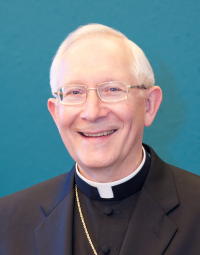
Archbishop Leonard P. Blair
The Lenten season always challenges us to step back and take stock of our lives in light of the two admonitions we heard when we receive ashes on Ash Wednesday: “Remember that you are dust and to dust you shall return” and “Repent and believe in the Gospel.”
That we are dust, that we are mortal, is brought home to us in the midst of the pandemic. Our frailty is painfully apparent, as is our mortality, notwithstanding all our efforts to overcome disease and death. But that is not the end of the story. Far from it. The unseen truth is that we really are immortal beings, fallen but with the promise of redemption through repentance and faith in Jesus Christ. This is because Jesus conquered sin and death “in the flesh” by his resurrection from the dead. This is the “good news” of the Gospel.
Lent and Easter are two sides of one mystery; you can’t have one without the other. For a person of faith, there is no Easter without Good Friday and no Good Friday without Easter. This is our comfort and consolation, and indeed the source of our spiritual resilience in the face of the pandemic and all life’s trials and tribulations, including death itself.
This was brought home to me at the opening of the tomb of Blessed Michael McGivney shortly before his beatification. He died at a relatively young age during a 19th-century pandemic, and his physical remains are a very stark reminder of his mortality. But thanks to Christ’s Easter victory over sin and death, Blessed Michael remains very much alive. At the last day, he will rise victorious even in the flesh, and that is why we venerate his relics. Where he has gone, we hope to follow. We can if we remain united to Christ by faith and obedience to all that God wills for us. And since we are weak and often stumble and fail along the way, repentance is the “road home” offered to us, especially during Lent.
In life Blessed Michael McGivney exemplified a “self-emptying” in keeping with his vocation as a priest. By that I mean that he gave his all in the service of those entrusted to his pastoral care. The patron of our archdiocese, St. Joseph, whose feast day we celebrate on March 19, did the same. By blind obedience to an angel appearing in a dream, Joseph accepted a mission in life that makes no sense at all from a purely human perspective.
Like St. Joseph, like Blessed Michael McGivney and all the saints, we are called to live by faith, not by sight. For us, it may mean bearing up under the cross of insecurity or anxiety at a time of pandemic or amid life’s “reversals of fortune and painful privations.” Maybe it means remaining faithful to the duties of our state in life as spouses, parents, clergy or religious, even when we are tempted to do otherwise. Faith also means making a gift of oneself in the service of God and neighbor. During the pandemic, we have witnessed many heroic and selfless acts of charity and service, and we are all called to do the same.
Nothing endears us to God more, or gives him greater delight, than when we surrender ourselves to what is asked of us in trying circumstances. Call it blind faith if you will, but it is the price of discipleship and it is the door to eternal happiness. Yes, we are dust and to dust we shall return, but by faith we know that when what was sown corruptible is raised incorruptible, then we shall see God as he is and become like him in happiness forever.
